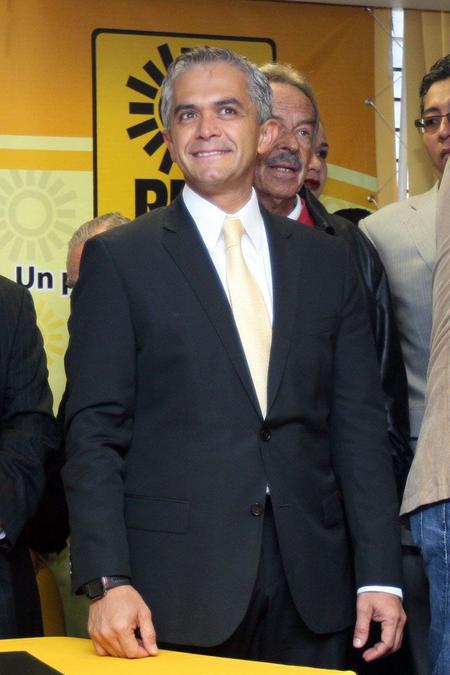Adhering to the results of three independent polls of Mexico City’s registered voters, Mexico’s center-left electoral coalition, known in this election cycle as the Progressive Movement Coalition, or, informally, the coalition of “the lefts,” agreed last Thursday to nominate Miguel Ángel Mancera to be its candidate to govern Mexico City.

The coalition is dominated by the Party of the Democratic Revolution (PRD), itself a coalition of constantly feuding leftist and center-left factions. It includes two smaller parties, the Workers Party (PT) and the Citizens Movement (MC), as well as a social movement called the Movement for National Regeneration (Morena), which was put together by the coalition’s presumed presidential candidate, Andrés Manuel López Obrador (AMLO), to support his campaign for the presidency and to act as a bridge between the progressive movements of civil society and the state.
(The general election, which will be fought amongst the coalitions formed by the country’s three principal parties, the PRD, the right-of-center National Action Party (PAN), and the corporatist/populist Institutional Revolutionary Party (PRI), will be held in July. Strictly speaking, the election is for the post of governor of the Federal District, an area that includes Mexico City proper, as well as several municipalities lying outside the city limits.)
The conflict-ridden PRD has changed its nomination process from open primaries to professionally conducted opinion polls in order to minimize the animosity and mistrust (and near dissolution of the party) brought about in previous internal-election cycles by bitter campaigns, accusations of fraud, last-minute changes in voting locations and even the destruction of ballots. Given that self-destructive history, there is a widespread consensus within the party that the left(s) can only maintain an electoral presence in Mexico by respecting the results of the independently conducted opinion polls. The coalition’s two minor partners have by and large gone along with the polling results, and the system seems to be working.
Mancera competed in the polls as an “external” candidate, not being a member of any of the coalition’s parties, but he has long had close connections within the PRD. He served under the last two PRD governors of the city, AMLO and outgoing mayor Marcelo Ebrard, mostly in prosecutorial and law enforcement positions, including his recent post as the Federal District’s Attorney General. He has promised to use that experience to take a hard line against crime and public disorder. He has had Ebrard’s support against the four other final candidates of the nominating process.
The left wing of the PRD (along with much of the independent left) supported the candidacy of a long-time leftist politician named Martí Batres. Bartres was the city’s Secretary of Social Development who was asked by Ebrard to relinquish his post last summer when he refused to stop referring to President Felipe Calderón as an “illegitimate president”—a phrase used repeatedly by López Obrador—for the apparent fraud committed in his 2006 election. The polls placed Batres in third place, behind Mancera and city legislator Alejandra Barrales. Batres quickly accepted the results, championing party unity and his own political future, and has vowed to support both AMLO for the presidency and Mancera for the governorship of the city.
Barrales, on the other hand, a former trade unionist also supported by many on the left, accused Ebrard of running a “state election,” in which Mancera was backed by the resources of the city government. Barrales’s complaints were reinforced when, a few days before the polling results were made public, the city’s Secretary of Tourism, Alejandro Rojas, while on a visit to Madrid, remarked that he had information that Mancera had won the polling process by a large margin. An embarrassed Governor Ebrard immediately asked Rojas to resign, but the damage had been done; the perception that the insiders in Ebrard’s administration knew and approved of the results before they were announced, embittered the aftermath of the campaign. Barrales waited several days before allowing her staff to talk to Mancera’s staff about her willingness to accept the results and support Mancera’s campaign.
Like the polls that determined the presidential candidacy of the lefts, won this past November by Andrés Manuel López Obrador, three independent polling agencies were commissioned to ask a sample of registered voters a number of questions measuring five dimensions of support: What is your opinion of [name of Candidate]? Which of these five candidates would you probably vote for in a general election? For whom would you definitely not vote? For whom would you vote in an election involving [Candidate] and [The Presumed Candidates of the opposing parties]? With which of these candidates are you familiar? Mancera led in four of the five categories (He had the most positives and the least negatives); Barrales won the fifth category, being the best known. Three of the five candidates, Mancera, Barrales, and Batres polled at least as well as (and in Mancera’s case considerably better than) the presumed PRI candidate, Beatriz Paredes.
Indeed, much of Mancera’s support came from the perception that he would run strongly against the candidates of the resurgent PRI and the conservative PAN in July’s general election. The conventional wisdom here is that he gained Ebrard’s support when he scored well in early polls taken last summer. The feeling among most political analysts is that the loss of Mexico City would relegate the PRD to near-oblivion on a national scale. More than ideology or the presumed ability to do the job, electability was Mancera’s strong suit in the nominating process.
Meanwhile, since party infighting has been the PRD’s kiss of near death, Mancera has asked Barrales to join his campaign.
For more from Fred Rosen's blog, "Mexico, Bewildered and Contested," visit nacla.org/blog/mexico-bewildered-contested. See also the May/June 2011 NACLA Report "Mexico's Drug Crisis," or NACLA blogs Border Wars for more on the U.S.-Mexico border.

